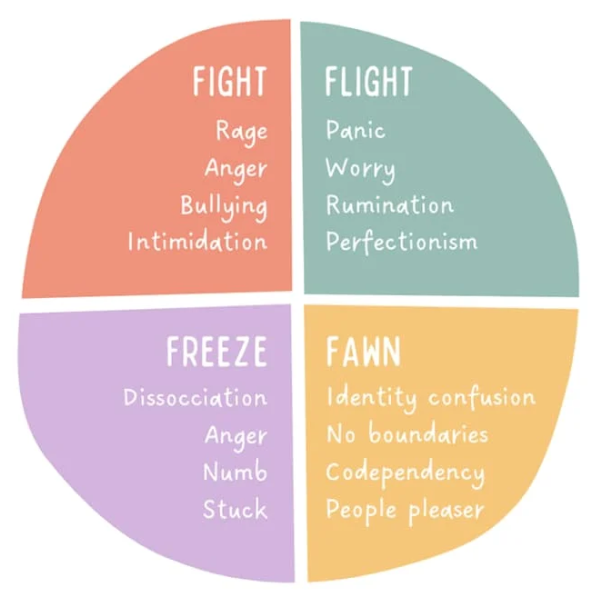Learn to love your caveman brain
- Alexis Booth
- Apr 14, 2025
- 3 min read
Updated: Dec 14, 2025
The human brain is the last, and greatest, scientific frontier. - Unknown

Today’s newsletter provides highlights and personal reflections from Episode 1. In it, my long-time career and life coach Kori Linn helps me reflect on several natural human responses we inherited from our caveman ancestors, which often hold us back in our modern day lives.
In this post, I explore 3 topics from the episode - but there’s plenty more for you to listen in to. I hope you’ll check it out. 🔊 Apple Podcasts | Spotify | Website Player
👉 Stress Response: Your Body's Ancient Survival Mechanism

Have you ever felt like you “froze” in a high-pressure situation, or wanted to run away from it altogether?
If so, you are not alone - in fact, the human body is naturally wired with four primary responses when a stressful situation occurs.
Fight: Becoming aggressive or confrontational
Flight: Running away or avoiding the situation
Freeze: Playing dead or becoming unresponsive
Fawn: Appealing to others to avoid conflict
While these responses were crucial for the survival of our caveman ancestors, they often don’t serve us in modern-day life. But by knowing about them, you can more effectively navigate stressful situations and make active choices about what to do next - rather than letting your body take over.
🎯 Practical Tips: The next time you notice yourself experiencing a stress response, try to:
Take a pause, or step away from the situation while you are in an agitated state
Accelerate completing the stress response cycle through activities like exercise, meditation, finding social connection, finding a creative outlet, and getting a good rest.
👉 Negativity Bias: Notice the Bad, Overlook the Good

Our brains are like "Velcro for negative experiences and Teflon for positive ones" - I love Kori’s visual from our conversation!
Humans are hard-wired to pay attention to negative information - it’s an evolutionary adaptation that kept our cavemen ancestors alive. But nowadays, negativity bias means we tend to dwell on negative feedback or experiences, even when our lives are filled with positive ones.
🎯 Practical Tip: Actively pay attention to your progress and wins - and celebrate them!
Alexis and Kori discuss creating a positive group habit, with a “Celebrations, Wins and Delights” channel. Consider starting your own - with your friends in a group text thread - or with colleagues in a Slack channel!
If you’d rather “do it alone” - unleash your inner child and make a star chart or a pom pom jar, visually recognizing all the progress and wins you achieve every day!
I recommend recognizing even the smallest steps you make - there are so many things we overlook every day that are worth celebrating.
👉 The Arrival Fallacy: The Myth of "Once I Reach My Goal, I'll Be Happy"

Many of us imagine that when we finally achieve a specific goal - especially one that takes a long time to achieve - we’ll feel a lasting sense of satisfaction.
Unfortunately, science has found that while we may experience joy when we reach the goal, it tends to be short-lived and we quickly adapt to our new circumstances. The lingering feeling of dissatisfaction often leads us to find new goals to chase, and an ongoing cycle of feeling like we’re not enough.
🎯 Practical Tips: Look for ways to enjoy your journey, don’t just fantasize about your future.
Learn to enjoy your imperfect life now, while you are working toward your goals. There are likely many things to celebrate and practice gratitude for in your present moment.
Give yourself permission to change your mind about goals you set previously. If you realize it’s no longer what you want, or it’s not worth the effort, it’s OK to pivot and focus your attention on the things that will bring you satisfaction. In fact, I’d encourage it!
👉 Some Final Thoughts
I hope this newsletter shed new light on concepts you hadn't known about before. When I learned about stress response just a few short years ago, it turned out to be one of the most transformative concepts I've applied to my life - on every front.
You are a human being, not a human doing. The key to having a lasting, successful career and a balanced life is not to try and overcome your human conditions, but to learn to accept them, love them (because they are a part of being alive in your human body) - and work with them. Understanding your own wiring will give you back the agency to respond intentionally instead of reacting instinctively, and make room to have self compassion for your sometimes silly brain.
Go be a good human to yourself this week. You deserve it.
💥 Break Out!

PS - if you find Kori’s advice as useful as I do, subscribe to her newsletter!
🔊 Listen to the full episode: Apple Podcasts | Spotify | Website Player




Comments